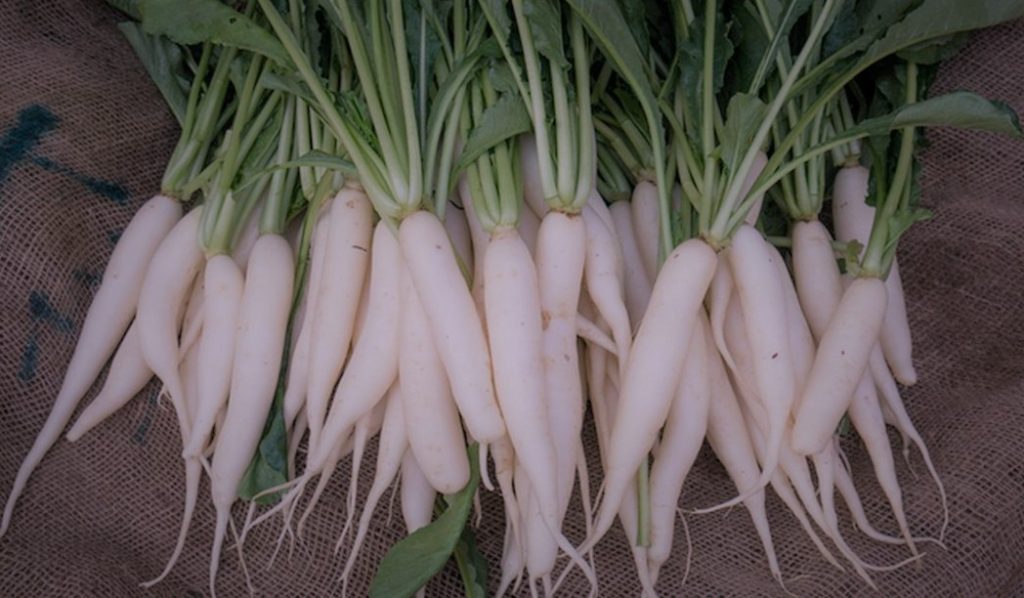Radishes are a gathering of root vegetables with light-shaded, crunchy tissue, variable skin tone, and a practically zesty, peppery taste. They fluctuate in shape from short and round to long and limited, and the skin can be red, dark, white, yellow, pink, or purple.
Raphanus sativa is the parent tamed species for a wide range of radishes. The variety and state of the radish is which isolates them into various assortments. The radish is reasonable local to Southeast Asia or Focal Asia. Antiquated Greeks and Romans around a long time back likewise involved it for food and restorative purposes. A long time back, individuals started to develop the wild radish and support its spread across new grounds.
Selection And Storage of Raddish
By and large, radishes can be accessible all year; with the pinnacle season being winter and spring. Daikons are generally tasty and delicious during winter.
Search for the roots that highlight new, heavy, and firm in surface. Their top greens additionally ought to be new and highlight fresh green with practically no yellow, wilted leaves. Keep away from roots that have breaks or cuts on their surface. Search cautiously for the adjustment of their surface and variety. Yellowness demonstrated the stock is old. Assuming the root respects pressure and delicate, the inside probably be succinct rather than firm.
Once at home, eliminate their top greens since they loot supplements off the roots whenever left in salvageable shape. Then wash completely with wipe water to free off surface residue and soil. Store them in a zip pocket or plastic sack in the cooler where they stay new for as long as seven days.
Nutrition Facts
19 calories
4 grams of carbohydrates
0.8 grams of protein
0.1 grams of fat
1.9 grams of fiber
17.2 milligrams of vitamin C (29% DV)
270 milligrams of potassium (8% DV)
29 micrograms folate (7% DV)
0.1 milligram vitamin B6 (4% DV)
0.1 milligrams of manganese (4% DV)


Health Benefits of Radishes
Assist with forestalling disease
What are the medical advantages of radishes? Where do we start! Like other cruciferous vegetables, radishes contain intensifies that assist with cleansing malignant growth causing substances and forestall the improvement of cancers. The crunchy detoxifiers are remembered to assist with safeguarding the body against colon, kidney, digestive, stomach and oral malignant growth, specifically.
Work on the appearance of your skin
The L-ascorbic acid in radishes, alongside zinc and phosphorus can assist you with battling skin dryness, skin inflammation and rashes. The high water content in radishes (and different products of the soil) additionally helps hydrate the skin. To make a characteristic chemical or cover for your face, utilize crushed crude radishes.
Support a Healthy heart
Radishes are likewise a decent hotspot for anthocyanins. These flavonoids not just give radishes their red tone, they additionally assist with keeping our hearts siphoning. However, radishes aren’t the main geniuses in the produce segment. Search for each of the seven superfoods that will keep you feeling amazing.
Keep your stomach related framework moving
Radishes are loaded with roughage and fiber, so they’ll assist with keeping your stomach related framework moving. (A half-cup serving of radishes contains 1 gram of fiber.) Fiber likewise may assist with overseeing glucose levels.
Support insusceptibility and energy
A half cup of radishes day to day has very nearly 15% of your day to day admission of L-ascorbic acid. L-ascorbic acid not just lifts your safe framework, it additionally directs the digestion and is vital to the body’s course of changing fat into usable energy.
Wealthy in defensive plant compounds
Daikon contains many plant intensifies that might further develop wellbeing and proposition security against specific illnesses.
One test-tube investigation discovered that daikon extricate contained the polyphenol cell reinforcements ferulic corrosive and quercetin, the two of which have calming, anticancer, and resistant supporting properties .
Also, cruciferous vegetables like daikon offer naturally dynamic mixtures called glucosinolates, what separate to frame isothiocyanates.
Test-cylinder and creature research shows that these mixtures might give strong malignant growth battling properties.
Besides, populace studies show that eating a great deal of cruciferous vegetables like radishes might safeguard against specific tumors, including of the colon and lungs

